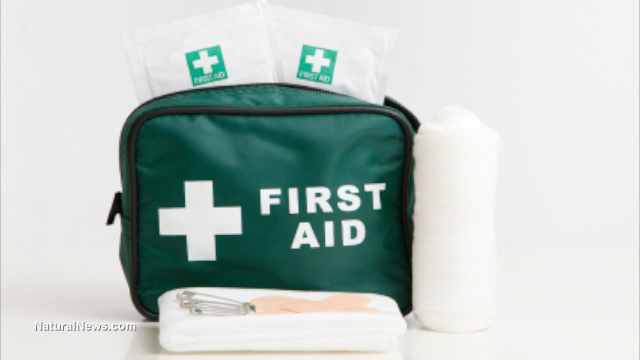Revelation: Secret government warehouses stockpiling $7 billion worth of medical supplies in preparation for deadly pandemic, biological attack
Wednesday, July 06, 2016 by: David Gutierrez, staff writer
Tags: stockpiling medical supplies, government, CDC

(NaturalNews) Is it "crazy" and "paranoid" to stockpile supplies against the possibility of widespread social collapse? Not according to the federal government.
The Centers for Disease Control and Prevention (CDC) maintains six warehouses stockpiled billions of dollars worth of medical supplies to be used to respond to any national medical emergency, including a flu pandemic or terrorist attack. Both the contents and locations of the warehouses are kept secret by law.
"If everybody knows exactly what we have, then you know exactly what you can do to us that we can't fix," said Greg Burel, who directs the program, known as the Strategic National Stockpile.
The Strategic National Stockpile was launched in 1999, with a $50 million budget. The value of the stockpile now exceeds $7 billion.
Enormously expensive project
The warehouses are enormous; Burel describes them as two Super Walmarts side-by-side, without the drop ceiling.Nell Greenfieldboyce of National Public Radio, who recently became the first reporter allowed to visit one of the warehouses, said that "shelves packed with stuff stand so tall that looking up makes me dizzy."
Although the specific contents of the stockpile are classified, the CDC says that, in general terms, the stockpiles contain millions of vaccine doses (for both pandemic and bioterrorist events), radiation treatments, antidotes to chemical weapons, and standard medical supplies such as antibiotics, IV fluid and wound care supplies. Greenfieldboyce writes of an entire caged, locked section of the warehouse that she was told contain addictive painkillers, and a giant freezer for the storage of more perishable drugs.
Maintaining the stockpile costs the government an enormous amount of money. Among the items stockpiled are ventilators that need to be charged monthly and receive yearly maintenance. Additionally, the entire stockpile must be inventoried annually, and expired drugs must be discarded and replaced.
From its starting $50 million, the stockpile's annual budget has now ballooned to half a billion dollars.
But would it deliver as promised?
Public health specialists and others have raised serious concerns over how helpful the stockpiles would be in a real crisis, however.For one thing, the stockpile has tended in recent years to stock up on newer drugs, which tend to be more expensive and have a shorter life. This means significantly higher costs, building over the long term. But even as the expenses of the stockpile continue to grow, its budget has not kept pace.
"This is an unsustainable plan," said Tara O'Toole, an intelligence consultant and former homeland security official. "And we don't think there's enough money to do what the stockpile says it must do, already."
Experts have also raised concerns that in a real emergency, the stockpile would not actually be able to deploy the needed supplies quickly enough.
"It is not going to be easy or simple to put medicines in the hand of everybody who wants it," O'Toole said.
The stockpile is certainly designed with quick delivery in mind. But there's another major problem with the system, as it stands: In an emergency, items from the stockpile would be delivered to workers at state and local public health agencies that have seen their budgets severely slashed and are notoriously understaffed.
"We have drastically decreased the level of state public health resources in the last decade," O'Toole said. "We've lost 50,000 state and local health officials. That's a huge hit. The notion that this is all going to be top down, that the feds are in charge and the feds will deliver, is wrong."
Given the serious problems with the national stockpile system, it's even more ironic that people who develop their own stockpiles -- which unlike the government stockpiles, may also include food, water, and other essential supplies -- are often belittled as crazy and unrealistic. But when the time comes, you'll be glad you chose to be prepared.
Sources for this article include:
http://www.npr.org
http://www.naturalnews.com
Stockpiling medical supplies at FETCH.news
Get independent news alerts on natural cures, food lab tests, cannabis medicine, science, robotics, drones, privacy and more.
Take Action: Support Natural News by linking to this article from your website
Permalink to this article:
Embed article link: (copy HTML code below):
Reprinting this article:
Non-commercial use OK, cite NaturalNews.com with clickable link.
Follow Natural News on Facebook, Twitter, Google Plus, and Pinterest
- Newly released JFK files reveal Pentagon's role in creating Lyme disease and covid in the same lab
- Trump's greatest betrayal so far: Accelerating Middle East wars, silencing dissent, and serving Zionist masters
- The hidden dangers in your kitchen: How cooking methods impact diabetes, cancer and aging
- STARDUST, a secretive Israeli-US startup, plans risky solar geoengineering experiment to BLOCK OUT THE SUN
- DEADLY DECEPTION: How COVID vaccines increased mortality rates and why authorities hid the truth
- Arkansas embraces medical freedom with landmark ivermectin law
- Lab leak confirmed? Boris Johnson's stunning reversal on COVID origins sparks global debate
- CDC finally halts $11 billion COVID funding scam as health officials admit the ‘pandemic’ was a fraud
- Home gardening for preppers: A beginner's guide to growing your own food
- Unraveling the paradox: Why intelligent individuals fall prey to everyday blunders
- GAIN-OF-FUNCTION CAT-BIRD-FLU now on the rise as nearly a dozen cats in Colorado "test positive" for Bird Flu due to contaminated cat food
- YouTube’s double standard: CEO defends censorship while claiming free speech champion status
- “Feel G.O.O.D. Gut Health Program” on BrightU: Why elimination diet is good for you
- Cartels shift tactics: Kidnappings and organ trafficking surge as border crossings plummet under Trump policies
- Why you should think twice before buying mainstream toothpaste formulas
- “Rent-a-womb” scandal: How China is exploiting U.S. birthright citizenship for long-term espionage
- Was JFK's assassination orchestrated by a CIA double agent? New evidence points to James Angleton as the “architect”
- Record honeybee deaths devastate U.S. agriculture, pesticides under scrutiny
- Newly released JFK files reveal Pentagon's role in creating Lyme disease and covid in the same lab
- Elon Musk: Aliens could be here on Earth RIGHT NOW
- Reclaim your health: How midlife exercise reverses years of inactivity
- Trump reverses course on Gaza plan, says “nobody is expelling Palestinians”
- EPA advisor admits the agency is funneling billions to climate groups ahead of Trump’s return to White House
- Big Pharma's $8 Billion bribery scheme exposed: how doctors are pushed to prescribe junk science, not heal
- Space war brewing? Russia threatens to destroy Starlink satellites
- A lack of integrity in Academia: Harvard professor found GUILTY of fraudulent research to promote CRT theory
- Survival 101: Effective EMF blocking techniques
- Rep. Nancy Mace introduces bill to ban biological males from female facilities on federal property
- Mike Adams Sermon 66: God will DESTROY ISRAEL for its wickedness
- Pilots report mysterious lights 'moving at extreme speeds' across Oregon skies
- 5 Simple steps to boost your brainpower: How to strengthen executive function in a distracted world
- Historian warns Israel may be entering an “IRREMEDIABLE DECLINE”
- Florida takes a stand: DeSantis proposes permanent ban on mRNA vaccine mandates
- RFK Jr.'s SSRI antidepressant investigation sparks liberal meltdown, exposes Big Pharma's dangerous game
- OpenAI whistleblower who dissented against how the company trained ChatGPT found dead
- Sugarcane extract superior to cholesterol-lowering drugs?
- EPA advisor admits the agency is funneling billions to climate groups ahead of Trump’s return to White House
- The Health Ranger releases “Vaccine Zombie” song and music video, using AI-animated zombies for the music video
- California's social media censorship law struck down: A victory for free speech or a threat to online safety?
- Dr. Mike Yeadon releases 15-minute testimony - WATCH - about genocidal intent of COVID “vaccines”
- The pandemic as a tool for INDOCTRINATION: Understanding “The Indoctrinated Brain” by Dr. Michael Nehls
- Mike Adams releases country western hit single: Goin’ Back in Time is Comin’ Home
- Mike Adams releases music poetry sensation: A Child of God
- RFK Jr. clears key hurdle: Sen. Susan Collins backs controversial HHS nominee, signaling a new era for health policy
- Florida takes a stand: DeSantis proposes permanent ban on mRNA vaccine mandates
- Unpacking the Lies That We’ve Been Fed – new song and music video released by Mike Adams, the Health Ranger
- Mike Adams releases new song and music video: Nothing More Disgusting Than a Globalist
- Congratulations to the FULLY UNVACCINATED as you resisted the COVID-19 PROPAGANDA MACHINE fueled by over $100 BILLION
- “Why we influenced the 2020 elections”: Facebook files reveal the coordinated effort to bury the Hunter Biden laptop story
- Michigan sheriff announces criminal investigation into 2020 election crimes, Dominion Voting Systems
- Israeli soldiers accused of even more torture and abuse in the West Bank
- Migrants are taking advantage of recent hurricanes to scam residents and loot their homes
- House Intelligence Committee calls for the ARREST and PROSECUTION of Dr. Anthony Fauci
- Peter Rost exposes Big Pharma corruption in his book “The Whistleblower: Confessions of a Healthcare Hitman”
- Red Cross issues warning to stop blood plasma donations from vaccinated people
- Scientists confirm: GENIUS brain function can be spontaneously unleashed in humans without any apparent cause
- EPA advisor admits the agency is funneling billions to climate groups ahead of Trump’s return to White House
- HYSSOP: What research reveals about the health benefits of this ancient holy herb
- Two containers with completed ballots fall out of truck in Florida
- Fully vaccinated about to see “tsunami” of illness and death, warns virologist
- Global leaders unite to clamp down on “misinformation” with UN-backed Cascais Declaration
- BREAKING: 2025 NDAA authorizes mandatory military draft of WOMEN across America… as Pentagon pursues global NUCLEAR war with both Russia and China at the same time
- Michael Yon warns of a ZIONIST TAKEOVER in Trump’s second administration
- BOMBSHELL: DNA testing kits are a SCAM to develop ethnic-specific bioweapons
- Ozempic and Wegovy weight loss drugs are injectable LIZARD VENOM PEPTIDES that may unleash a devastating wave of organ failure… side effects align with symptoms of SNAKE BITES
- Israeli soldiers accused of even more torture and abuse in the West Bank
- These 13 countries just signed an agreement to engineer a global FAMINE by destroying food supply
- NASA admits that climate change occurs because of changes in Earth’s solar orbit, and NOT because of SUVs and fossil fuels
- RFK Jr. clears key hurdle: Sen. Susan Collins backs controversial HHS nominee, signaling a new era for health policy
- Sermon 30: How Jesus reveals Caesar’s FAKE CURRENCY and FALSE AUTHORITY
- Coriander seeds: Ancient medicine backed by modern science
- Arizona officials claim Maricopa County needs 10-13 days to tabulate results of the election
Science News & Studies
Medicine News and Information
Food News & Studies
Health News & Studies
Herbs News & Information
Pollution News & Studies
Cancer News & Studies
Climate News & Studies
Survival News & Information
Gear News & Information
News covering technology, stocks, hackers, and more



"Big Tech and mainstream media are constantly trying to silence the independent voices that dare to bring you the truth about toxic food ingredients, dangerous medications and the failed, fraudulent science of the profit-driven medical establishment.
Email is one of the best ways to make sure you stay informed, without the censorship of the tech giants (Google, Apple, Facebook, Twitter, YouTube, etc.). Stay informed and you'll even likely learn information that may help save your own life."
–The Health Ranger, Mike Adams












































